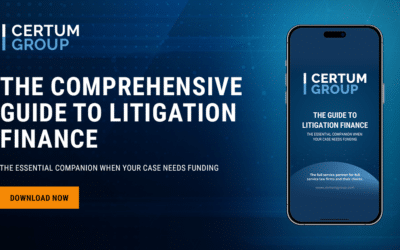Pretty much every litigator I know wants, or wants to learn more about, litigation finance. Everyone has a general sense that it helps clients get better access to the courts. Junior partners want it to build a plaintiff-side docket. Senior partners want it to satisfy long-standing corporate clients who balk at increasingly high rack rates. And associates want it mostly because its new and exciting—and might give them an advantage in making their business case for partnership. But most people have no idea what specific products are available, how to choose a funder, what is required in the submission process, what issues are key during diligence, or what terms to expect in the term sheet. The purpose of this and subsequent blog posts is to provide a hornbook view of litigation finance, explaining how it can help your clients or business, and what you need in order to get your case funded. To that end, this post answers the question of why you should consider litigation finance through the prism of a few common use scenarios. Each illustrates the same fundamental point: Litigation can be a valuable asset.
David vs. Goliath.
Sometimes it feels like only three things in life are certain: death, taxes, and the mounting cost of civil litigation. Hiring top counsel to litigate a plaintiff-side civil litigation can easily cost $5 million or more (and sometimes much more) over the life of the litigation. Very few companies have that kind of cash lying around. And the other side of the “v” knows this, often employing tactics that purposefully increase costs via, for example, discovery fights. While this creates tremendous financial pressure for even the most well capitalized of litigants, it is simply devastating for smaller companies who do not have the financial resources to hire and field quality litigation counsel—notwithstanding the merits of their claims or defenses. Litigation finance levels the playing field in such situations, removing the financial advantage held by well-capitalized litigants and making the unequivocal statement that you will not only litigate the case, but have the resources to do so vigorously.
Goliath vs. Goliath.
Even when a company has the money to pay for quality counsel, there are times when doing so simply does not make financial sense. For example, imagine a situation where your business is sued. You have meritorious defenses and counterclaims. And you have the money to hire white-shoe representation. But you are hesitant to do so because paying that counsel will draw on funds better and more effectively used to grow your business. After all, standard business theory dictates that companies should invest their capital in their “core” business – which is usually building widgets, not financing lawsuits, no matter how meritorious those suits might be. In such situations, litigation finance is a strategic financial tool that can help companies manage legal costs, mitigate risk, and enhance shareholder value, allowing you to focus on your core business operations with confidence.
Project Finance.
It is no secret that startups need money. It is also no secret that venture capital firms, while generous with growth capital, can be expensive money because VCs demand significant equity in exchange for their financing. For growth-stage companies with meritorious claims, monetizing legal claims through non-recourse capital can be the cheapest way to raise money to expand the business—all without diluting your equity stake.
Law Firm Portfolio.
Litigation finance can be provided directly to law firms. Entering into a portfolio funding arrangement brings many benefits to law firms. A portfolio arrangement helps make firms more competitive when seeking new work, because they can sign up clients on a full contingency basis, reducing their risk on the “back end” with a litigation funder. Additionally, by creating a diversified pool of assets, law firms can usually take advantage of better pricing than would obtain if the funder were only financing a single matter. Moreover, developing a close relationship with a funder can help the firm leverage the funder’s expertise to win clients and build a large book of business.
Claim Monetization.
Litigation is, at its core, uncertain. Litigants often face the prospect of years’ worth of counsel fees, in addition to the distinct possibility of receiving nothing when the process is over. Moreover, companies often find themselves resorting to litigation after a competitor has breached a contract or misappropriated trade secrets, leaving the company’s business in shambles; indeed, the most valuable asset you may have could be the legal claim itself. Litigation funding allows you to leverage your claim to raise the capital you need to rebuild a distressed business. Claim monetization also allows you to achieve certainty by turning corporate claims into an immediate capital infusion that ensures you receive the compensation you deserve without the burden of prolonged and indeterminate litigation.
Funding w/ Insurance.
Litigation funding is, as you would expect, not free. But there are ways to substantially decrease its cost. For example, companies are increasingly seeking litigation finance and then wrapping that financing with insurance. When these two products are combined, they can significantly decrease the cost of capital, freeing up additional funds to run and expand your business. Certum is the only funder that offers both litigation finance and insurance solutions.
A Third-Party Advisor.
Litigation funders spend all day—every day—reviewing cases. We see patterns. We see what works. And we also see what does not work. Properly leveraged, the expertise of a litigation funder can help you navigate the legal landscape to enhance case strategies, optimize outcomes, and maximize your chances of success. Litigation funders can help you decide which cases to bring, which cases to shelve, how to budget cases, and how to efficiently litigate your cases to conclusion. We are like business consultants for law.







